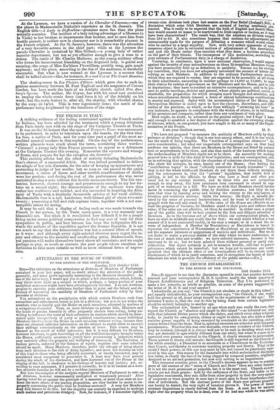THE FRENCH IN ITALY.
A striking evidence of the feeling entertained against the French nation by Italians, has been afforded by the treatment which a young debutante from Paris lately met with on the stage of the Carignan Theatre at Turin.
It was on the 3d instant that the opera of Torquato Tasso was announced to be performed, in order to introduce upon the boards, for the first time La Soss, a native of Paris, and for some time past a pupil of the most ac- credited musical teachers in that capital. On the day of the performance, written placards were stuck about the town, containing these words- " Citizens! a young lady from France presumes to appear as a debutante at the Carignan Theatre this evening. Remember the sorrows and wrongs of Rome, and prepare for her the reception she deserves."
This exciting affiche had the effect of entirely defeating Mademoiselle Soss's chance of a successful debut. She was indeed permitted to deliver the adagio of her aria d'entrata, for the sake of keeping up appearances and pretending to judge of her merits; but so soon as she passed to the quick movement, a storm of hisses and other terrible manifestations of dislike were her portion; and during the rest of the performance she was never permitted to sing a note without this hostile accompaniment. The fair can- tatrice, however, showed courage and perseverance enough to try her for- tune on a second night: the demonstrations of the audience were then rather less vociferous and unkind, and she succeeded in inspiring the dilet- tanti of Turin with a decidedly favourable opinion of her vocal abilities. Mademoiselle Soss is a tall, handsome, well-formed girl of about two-and- twenty; possessing a full and rich soprano voice, together with a not con- temptible talent for acting.
It may be said that a display of feeling such as was made towards the French in her person, by the Turin opera-goers, is a very unmanly and blameable act. But when it is recollected how difficult it is for a people living under severe political compression to find any sort of vent for their sympathies in public, and how intense has been the indignation felt to- wards the authors of the expedition against the Roman Republic, it is not too much to say that the demonstration was but a natural effort of speech, as it were: and although every right-minded observer must regret the in- jury and offence to the amiable and unoffending artist, Mademoiselle Soss, yet passions will make themselves heard above all restraints; and we ought perhaps to pity, as much as censure, the poor people whose emotions are forbidden to take more suitable as well as more effectual forms of expres- sion.
























 Previous page
Previous page